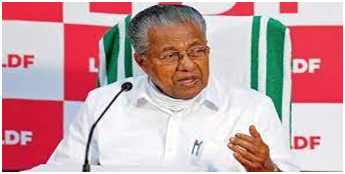Kerala govt proposes law to limit lokayukt powers
What is the news:
- The Kerala government proposes to amend the Kerala Lok Ayukta Actwith an ordinance, a move that has drawn criticism from the opposition.
What is the proposal:
- The cabinet has recommended to the Governor that he promulgate the ordinance, which proposes to give the government powers to “either accept or reject the verdict of the Lokayukta, after giving an opportunity of being heard”.
- Currently, under Section 14 of the Act, a public servant is required to vacate office if directed by the Lokayukta.
- The stated reason for this is that the state’s Advocate General K Gopalakrishna Kurup has given his opinion green-lighting the amendment. However, the move is widely seen as a fallout of the Supreme Court’s refusal in October last year to stay the Lokayukta decision holding CPI(M) leader K T Jaleel guilty of nepotism.
- Jaleel, who was Higher Education Minister during Pinarayi Vijayan’s first term as Chief Minister, had to resign after the Lokayukta decision.
- The Lokayukta is also currently investigating cases-one against Vijayan himself and Higher Education Minister R Bindu.

About lokpal act:
- The central Lokpal and Lokayuktas Act, 2013 was notified on January 1, 2014. The law was a result of demands of several decades for stronger anti-corruption laws.
- The Act provides for establishing a Lokpal headed by a Chairperson, who is or has been a Chief Justice of India, or is or has been a judge of the Supreme Court, or an eminent person who fulfils eligibility criteria as specified. Of its other members, not exceeding eight, 50% are to be judicial members, provided that not less than 50% belong to the SCs, STs, OBCs, minorities, or are women.
- The Lokpal and Lokayukta are to deal with complaints against public servants, a definition that includes the Lokpal chairperson and members.
- The Lokpal was appointed in March 2019 and it started functioning since March 2020 when its rules were framed. The Lokpal is at present headed by former Supreme Court Justice Pinaki Chandra Ghose.
- As per statistics on its official website, the Lokpal received 1,427 complaints in 2019-20, 110 in 2020-21, and 30 in 2021-22 up to July 2021. Due to a delay in framing rules, one of the judicial members, Justice (Retd) Dilip B Bhosale, has resigned.
How does it work in the states?
- Lokayuktas are the state equivalents of the central Lokpal. Section 63 of the Lokpal and Lokayuktas Act, 2013 states:
- “Every state shall establish a body to be known as the Lokayukta for the State, if not so established, constituted or appointed, by a law made by the State Legislature, to deal with complaints relating to corruption against certain public functionaries, within a period of one year from the date of commencement of this Act.”
- Originally, the central legislation was envisaged to make a Lokayukta in each state mandatory.
- However, regional parties and the BJP, which was in opposition then, argued that this would be against the spirit of federalism.
- The law then created a mere framework, leaving it to the states to decide the specifics.
Which states have Lokayuktas?
- When the 2013 Act was passed, Lokayuktas were already functioning in some states — including in Madhya Pradesh and Karnataka where they were very active. Following the Act and the intervention of the Supreme Court, most states have now set up a Lokayukta.
- In 2018, the Supreme Court had expressed concern that Jammu & Kashmir, Manipur, Meghalaya, Mizoram, Nagaland, Puducherry, Tamil Nadu, Telangana, Tripura, West Bengal and Arunachal Pradesh had not appointed any Lokayukta or Up-Lokayukta.
Subscribe
0 Comments





